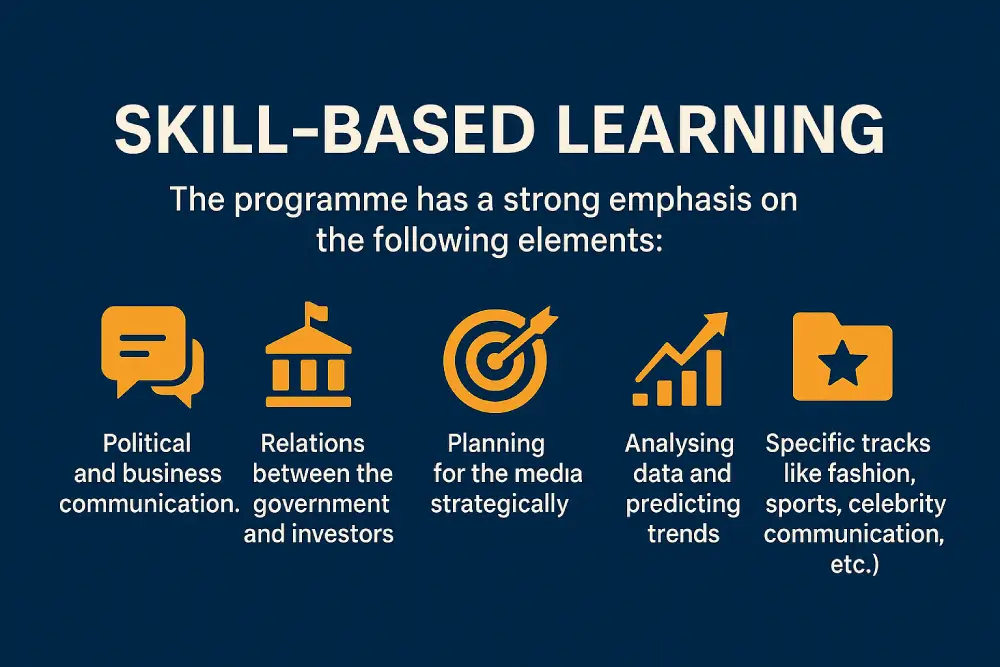In an era of rapid digital transformation and hyper-connectivity, corporate communication has emerged as a critical component of modern business strategy. Whether it’s managing a company’s reputation, engaging stakeholders, or dealing with crises, effective communication may influence an organisation’s trajectory.
India’s corporate communication landscape indicates its growing relevance. The Indian public relations sector grew to INR 2,500 crore in FY23 and is expected to nearly double by FY30, driven by increased digital and influencer outreach. Meanwhile, the unified communications market in India was valued at USD 4.9 billion in 2024 and is predicted to rise at a startling CAGR of 15.11% to USD 18.1 billion by 2033. These figures demonstrate the growing demand for professionals qualified to create compelling messaging in a complicated business environment.
What is corporate communication?
The strategic planning, implementation, and administration of communication between a business and its stakeholders—including its staff, investors, media, clients, and the general public—is known as corporate communication. It includes investor relations, crisis management, digital and social media strategy, and internal and external communication. A strong public image, trust, and consistent messaging are all facilitated by effective business communication.
Why Corporate Communication Matters
Over 45% of corporate communication professionals make between INR 22.5 lakh and INR 62.5 lakh a year, according to the India Communicators Group (ICG), demonstrating the lucrative potential of this industry. Competitive entry-level positions pay between INR 5.3 lakh and INR 5.8 lakh annually for new hires. With an average annual increase of INR 2.3 lakh, salaries are increasing steadily. These figures demonstrate how crucial communication is to corporate operations.
Career Paths in Corporate Communication
As businesses spend more money on communications strategy, there are many different career options available in the field:
- The corporate communication manager maintains brand consistency and supervises internal and external messages.
- A public relations officer creates information for the general public and oversees media relations.
- A crisis communication specialist manages delicate circumstances and contributes to the preservation of a brand’s reputation.
- An investor relations executive interacts with financial stakeholders and shareholders.
- A digital media strategist creates online campaigns and oversees the visibility of brands on various channels.
Media, finance, technology, healthcare, retail, non-profits, and the government are among the sectors that employ professionals in these positions.
The JSJC Advantage: Where Communication Meets Strategy
In order to address industry demands and develop future communicators, the Jindal School of Journalism and Communication (JSJC) provides a state-of-the-art four-year residential programme in Corporate Communication and Public Affairs.
What Sets the Programme Apart?
This programme is uniquely designed to bridge the gap between academic learning and real-world application. It empowers students to think critically, communicate strategically, and navigate diverse professional environments with confidence. Whether you’re aspiring to work in corporate sectors, government bodies, or creative industries, the programme equips you with the tools and insights to thrive.
Interdisciplinary Curriculum
In order to prepare for a variety of jobs in business and public affairs, students study the fundamentals of journalism, public relations, digital media, and political communication by fusing theory and practice.
Skill-Based Learning
The programme has a strong emphasis on the following elements:
- Political and business communication.
- Relations between the government and investors
- Planning for the media strategically
- Analysing data and predicting trends
- Specific tracks like fashion, sports, celebrity communication, etc.)
Explore Jindal School of Journalism and Communication
Corporate Communication & Public Affairs Course
Real-World Exposure
Students are guaranteed to have real-world experience prior to graduation through internships during breaks in the academic year and practical projects.
Capstone Project
Under the guidance of knowledgeable instructors, students finish a thesis or field report in their senior year, which makes a valuable contribution to their professional portfolio.
Support from Office of Career Services
Students receive assistance with networking, interview preparation, and job placement in high-level communication professions across industries from the Office of Career Services.
Communication is the Future
Professionals in corporate communication are essential to business strategy because of their engagement, honesty, and transparency. The field is expanding quickly, offering financial rewards and stimulating intellectually. Students are prepared for success through courses such as the B.A. in Corporate Communication and Public Affairs offered by JSJC.
Sources
- https://www.exchange4media.com/pr-and-corporate-communication-news/indian-pr-industry-surges-to-2500-cr-infy23-expected-to-nearly-double-by-fy30-140326.html
- https://www.imarcgroup.com/india-unified-communications-market
- https://jgu.edu.in/jsjc/courses?programme=undergraduate
- https://commsnews.com/icgs-salary-survey-report-reveals-compensation-trends-for-in-house-comms-roles/?
- https://jgu.edu.in/jsjc/admissions/bahons-corporate-communication-public-affairs
- https://jgu.edu.in/jsjc/






